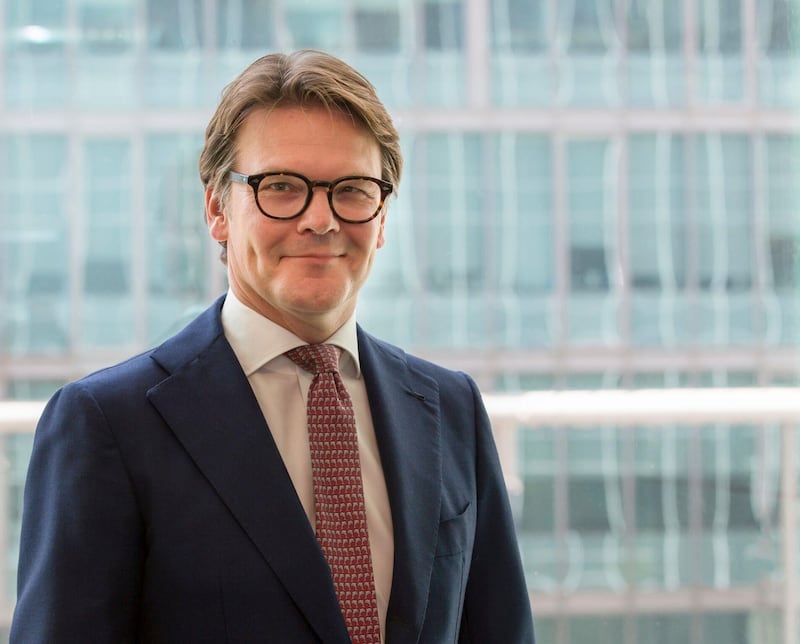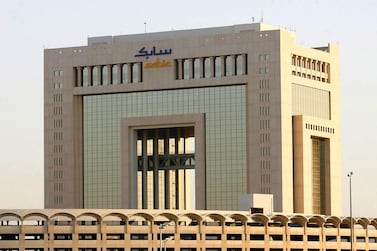JP Morgan, the biggest US lender by assets, is undeterred by a slowdown in Middle East economies and sees long-term growth for its business in the region, as sovereigns and corporates continue to issue debt, attract investment and drive mergers and acquisitions deals.
The lender, which has the biggest share of the global investment banking market, does not plan to alter its business strategy in hydrocarbon-rich economies facing headwinds on the back of oil price volatility and softening of global growth, Sjoerd Leenart, global head of corporate banking & regional head, Central & Eastern Europe, Middle East and Africa at JP Morgan, said.
"If we react to five year [economic] cycles then we can never build business. We basically look at decades and for the next few decades; this region is going to be incredibly important," Mr Leenart told The National in an interview in Abu Dhabi. "There are also a lot of different components to our business and they don't all behave the same way and they all are not GDP [gross domestic product]-related."
This year so far, is the best JP Morgan has had in a decade, both in terms of its investment banking revenues and improvement in its market position in the region, and the lender is “quite hopeful that the next year will be another one”, Mr Leenart said.
“We are in a position, which we never had [in the region],” he noted.
Investment banks are facing declining revenues as the global economy wobbles in the wake of intensifying trade wars. The amount of fees earned by investment banks has fallen by about 9 per cent year-on-year in the 12 months to August 22 to $62.9 billion (Dh231.1bn), according to Deals Intelligence. Moody’s investors Service in August changed its outlook for global investment banks to stable from positive, citing prospects of lower client activity.
However, JP Morgan, which accounts for a 6.6 per cent share of all investment banking fees earned until August, has invested heavily in scaling up its position in the Middle East, where oil-rich nations try to diversify their economies, opening up new avenues of business for global banks such as JP Morgan.
The lender has built a team of more than 200 personnel in the region, especially solidifying its presence in Saudi Arabia - the Arab world’s biggest economy - as it follows Vision 2030 agenda. Crown Prince Mohammed Bin Salman’s overarching economic overhaul vision includes radical changes in the scope of business for the kingdom’s sovereign wealth fund, Public Investment Fund; part privatisation of state-owned entities including Saudi Aramco and liberalisation of the country’s capital market to attract foreign direct investment.
Saudi Arabia’s Tadawul bourse, which was a fairly closed stock market until a few years ago, has implemented structural and regulatory reforms and successfully became part of the FTSE and MSCI indexes, attracting $22bn of inflows. JP Morgan was the second-biggest trader of Saudi equities in August, according to Tadawul data.
“In Saudi Arabia, we have definitely scaled up, because it not only traders and middle office and back office [staff], it is sales as well,” he said. “We have also built a local custody business, which is growing very fast because of all these FDI inflows.”
There is still room to grow as Saudi Arabia’s daily trading volume is about $900 million while for most other markets it is in the $50m range. About 80 to 90 per cent of the $25bn that entered regional markets this year is invested by passive investors, tracking the benchmark indexes.
“Active investors are not rushing in. They are watching the markets closely but not yet coming in a meaningful way,” Mr Leenart notes.
Apart from the brokerage businesses, debt issuances - both by corporates and sovereigns in the region - as well equity capital markets deals and mergers and acquisition mandates, shave helped prop up JP Morgan’s business in the Middle East.
Sovereigns, particularly the GCC states, have approached the international debt capital markets to plug their budget deficits and widen their funding base in the wake of three-year oil price shock. Abu Dhabi, which accounts for about 6 per cent of the world’s proven oil reserves, last month raised $10bn. Bahrain, last month also raised $2bn through a mix of bond and sukuk deals. Saudi Arabia is said to be considering plans to tap the debt market later this year, according to media reports.
Corporates have also enjoyed the low interest rate regime and diversified their fund sources by tapping the loan and bond markets. Orders for Saudi Aramco's debut international bonds topped $100bn, a record-breaking vote of market confidence for the oil giant; JP Morgan was among the banks on the deal. Adnoc is another state-owned oil company, which is considering bond plans, its chief financial officer said earlier this month.
“I think funding will continue [in the region] as we probably will have about $80bn of debt [issuance] volumes this year,” Mr Leenart said. “M&A, both inbound and outbound, will continue to keep us busy … both have equally big flows.”
The UAE, Saudi and Egypt the three biggest markets for JP Morgan, he said.
“UAE is a market where we have very strong companies and there is a big focus on bring in FDI …. $2bn here, $5bn there. They have done tremendously well on that front,” he said.
The value of mergers and acquisitions in the Middle East and North African has reached $120.6 in the first nine months of the year, up 160 per cent on the same period last year, according to data by Refinitiv. The biggest deals so far this year have been the $69bn acquisition of Sabic by Saudi Aramco, Kuwait Finance House’s $7.6bn purchase of Ahli United Bank and Adnoc’s $4bn sale of pipeline assets to US investment companies KKR and BlackRock.
“If you look at the equity deals, we have been involved in most of them [in the region]. The debt, we have a huge share and in M&A we are a leading bank in the region,” he said, adding that the business next year will be consistent with this year.
“So net-net, we see the same sort of deal flow in 2020, which we have seen in 2019, barring any major geopolitical or any other shock,” Mr Leenart said.








